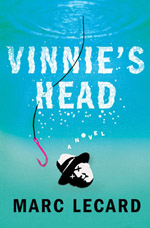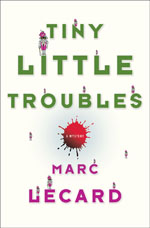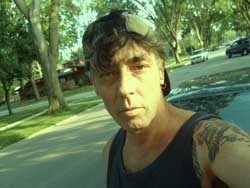- Welcome
- Noir Zine
- Allan Guthrie
- Books
"...those who enjoy the darker side of the genre are in for some serious thrills with this..."
Laura Wilson, The Guardian

Published in the UK by Polygon (March 19th, '09) and in the US by Houghton Mifflin Harcourt (Nov '09).
MarC Lecard
by Brian Murphy
 There’s bound to be a few --or maybe more than a few--who’ll have something to say about how I managed this interview with Marc Lecard (pictured right), author of Vinnie’s Head and the just released comic blockbuster ,Tiny Little Troubles.
There’s bound to be a few --or maybe more than a few--who’ll have something to say about how I managed this interview with Marc Lecard (pictured right), author of Vinnie’s Head and the just released comic blockbuster ,Tiny Little Troubles.
Some might go as far as to say I bollixed it badly – fucked it up, made a disgusting mess of the thing. I guess everyone is welcome to their opinion. But at five o’clock this morning, none of this had even entered my aching head. What worried me more was just where in the fuck had I left it. The interview
Marc had warned me. He told me he would sue if I didn’t explain that he’d made me agree that we’d share equal billing throughout this interview. He told me he’d call me a bold-faced liar if I even attempted to claim we’d taped anything.
Of course, I had the tape recorder running – at least I thought I had. I needed to find that little gadget, as well as the interview. I mean to say, I think there’s an interview somewhere.
If that empty bottle of Jose Quervo tequila laying snug and peaceful in my guitar case could talk, it would have a story or two, I’m sure. Maybe even tell me where my guitar was.
I must have been playing. Maybe writing a song while on the other end of the telephone, Marc Lecard, author and certified lunatic assured me the interview was coming along fine. I remember telling him, “That’s easy for you to say. I’m the one who has to write it.”
Finally, after finding my car keys hidden under a stack of Lenny Bruce albums, and telling myself I made a wise decision last night – hiding the keys – I was ready to forget this interview nonsense (funny, that’s what Lecard had called it), drive somewhere far away, cool and dark, where there were short-skirted Polish girls who only spoke enough English to ask how you were doing at seven in the morning without making you feel like a total fucking loser.
That’s when I found the digital tape recorder and my notes. The interview:
Great. Nothing on the tape recorder except for Marc singing while I coached him along, feeding him words, playing a slow, sad Celtic strut on the guitar.
The notebook. That was another story altogether. But a story, nevertheless. It was exactly the way he wanted it:
Brian Murphy: Do you want to answer any questions? I mean like, anything?
Marc Lecard: Anything sounds good.
Was Pompeii better for Rome once he trashed the Republic and bankrupted Rome fighting terrorists?
We’re going to find out soon. Personally I look forward to utter economic collapse and the birth of a new order.
Do you enjoy walking to work?
I crawl, the bosses seem to prefer it. Plus it saves wear and tear on my bicycle.
Any advice you might want to give an aspiring writer?
Read everything. And write a lot. Don’t worry if it’s shit, you can always change it later. Much better to have a pile of crap that can be fixed up into something than to worry so much about its quality that you can’t write.
Most writing is shit anyway. This will probably include you, so don’t worry about it. Enjoy yourself. Do the best you can.
Okay, this sounds flip and negative. But this is the advice I wish I'd gotten when I was starting out. I would have ignored it, of course, but it's what I needed to hear.
In keeping you honest, has this interview so far, kept you honest?
Honestly, I can’t tell.
I take terrible notes. Do you?
I take great notes, but my handwriting is so bad I can never read them afterwards.
No outline. Damn the torpedoes! Full steam ahead. That's fine when it's not your boat. By the way, are you a boater?
I was raised on the water. But I still can’t swim. Maybe someone will throw me an outline.
Are we both somehow, mysteriously linked to Costa Rica, where my main character will be heading, in chapter two of "Does The Hero Get The Check" - excerpts to be found also in this issue of Allan Guthrie's "Noir Originals?"
 I seem to have a fascination with running away to Latin America. It’s in Vinnie, its in Troubles, and only shame at repeating such an obvious pattern is keeping it out of my present novel. I guess I should learn Spanish.
I seem to have a fascination with running away to Latin America. It’s in Vinnie, its in Troubles, and only shame at repeating such an obvious pattern is keeping it out of my present novel. I guess I should learn Spanish.
I’ve always loved the thought of Costa Rica. It seems to have the Mayan coolness and attraction of Central America without the horrible oppression and massacre of the rest of the region. But I’ve never been there, so I don’t know if this is true.
The noir is difficult to accomplish with humor. Will you be attempting to prove me wrong in your next novel?
I think ‘noir” and comedy can’t coexist. Like matter and anti matter. I don’t mean humor. I find a grim fascination in things going badly wrong. They do. I do. I’m not sure why the worst things make me laugh, but they do.
I think that’s what you mean by “noir comedy.” But my books have happy endings, even if by that I mean only that the main character is still alive. Noir does not do happy endings.
Several characters will survive in the novel I’m working on now. Some of them will be happy, some disappointed, some just confused. The wicked are punished. So are the not so wicked. Everyone is one degree or another of scumbag, so the punishments seem somewhat arbitrary. That feels normal to me.
Who are some of your dark favorite writers?
Derek Raymond. Cornell Woolrich. Ken Bruen. George V. Higgins. Elmore Leonard, Joe R, Lansdale. Oh, and Donald Westlake for comedy. Carl Hiaasen for crazy.
West coast East coast: Which is bound to sink first and if it's the west, then why the fuck are you sitting on the fault line?
The west coast will fall into the sea, the east coast will flood. What’s the difference? But I need to be near salt water.
Do certain pens help you write more and better prose?
I always felt that rolling ball tips helped me write better prose. I could read it at least, which is something. But they felt better. It’s been years since I’ve written drafts by hand, though.
Has anger influenced your writing?
 Troubles is an angry book in many respects. That’s why there’s so much satire in it. It exhausts me to read it, because there’s so much anger in it. But I’m not sure it will be as apparent to other readers as it is to me.
Troubles is an angry book in many respects. That’s why there’s so much satire in it. It exhausts me to read it, because there’s so much anger in it. But I’m not sure it will be as apparent to other readers as it is to me.
I think I am through with upper middle class main characters, though. Because I kept wanting to kill them, but the plot wouldn’t allow it.
Is there anything you would like to say about the publishing industry... is there hope?
Big corporations are eventually going to get sick of the uncertainty and small profit margins of most publishing and leave it to people who are too passionate to know any better. It’s happening already as more and more market share is abandoned to new small presses as the big guys concentrate exclusively on books about celebrities and fantasy self-help. There is so much good work coming out now from small presses. It’s been true for a long time in the poetry world (of which I was once a part). Now it’s starting to happen with crime writing.
How great an influence has music been on your writing/sanity?
A tough argument to say I am sane or ever was. But music has kept me going in tough spots.
Who and which and how. Ha!
Playing more than listening. I play a bunch of instruments, none that well. I’ve got a lot of enthusiasm, but very basic skills. Irish, Quebecois, Breton--traditional music.
Growing up; Borsalino hats and cabretta leather jackets were significant thug wear. Any comments on how this could be possible?
No one under 50 on Long Island in the fifties and sixties wore Borsalinos. Leather jackets on the other hand have always been cool and still are.
Your father was a great story teller, in the oral tradition. How much were you influenced?
His stories were all about our family and our particular heritage, Breton Celts. They gave me a taste for narrative with a payoff, for ghosts and folk tales, for languages with few speakers.
*
So far, I was amazed I’d been able to write any of this down. We were having such a good time. Interviewing Marc Lecard was like doing a lot of acid, then remembering that you had to go back to your “Early World History” class, only you had no idea where it was in a school the size of Detroit.
*
What about your new literary effort, Tiny Little Troubles?
It’s a caper novel, with a criminal mastermind who is a real piece of work, and a brilliant scientist and inventor with a sex obsession.
Picture Elliot Spitzer, crusader and New York Governor, then give him a makeover --more hair, better looking by months, give him a sense of humor, a background in nanotechnology as well as the phone number to some delicious West Coast hookers, and you’ve got my main character, Aaron Rogell.
The criminal lead, Pablo Clench, was a gift of my subconscious. I don’t know where he came from. I usually put my characters together a piece at a time, but Clench just walked in and started talking. I love that, but it’s hard to count on.
So how did the new book come about? What was its “genesis?”
I always seem to write the wrong book first--or at least many many pages--and then give up, surrender the idea of ever writing anything, ever, again, before my brain will cough up something actually readable.
That's the way it worked with Vinnie's Head--I had to crank out 150 pages of a dark, serious, noir epic, a true fucking tragedy, and then realize it was shit, and throw it away, before the complete tonal opposite swam up like a severed head at the end of a fishing line.
That book really comes out of the invention of Johnnie LoDuco. The plot is an attempt to explain how someone like him could exist. The plot appears in front of him as he walks along and it’s generated by him, his choices, what he would do. And explosions.
Did you learn from this to cut to the chase, and go with the comedy?
As the Irish say, did I fuck.
After I finished Vinnie, I felt I had to write something not funny, something hard and fast and serious, to "show my range." And I tried, I really tried. I covered another 150 pages--that seems to be the magic number, the measure of my capacity for self-delusion--of a pretty dark cop drama, set on Long Island, with corruption, lies and betrayal, and explosions.
It may or may not have been shit--I haven't the heart to read it again--but it stopped happening with a vengeance. Hit the wall. Nowhere to go, no idea how to get there.
While struggling to advance the inert mass of my cop novel, I had a sudden vision, probably due to the strain, of a gangster being turned into a pile of damp underwear. I thought that was pretty funny. But what the fuck was going on? How could that happen?
Had to be nanotechnology, I concluded. Only robots you couldn't even see could possibly account for such a thing.
But what were gangsters doing, messing around with nanotechnology in the first place?
So I tried to find the answer to this question, and I managed to write Tiny Little Troubles, tossing in strippers, hookers, scientists, murder, extortion, kidnapping, and venture capital as I went along.
I managed to get to the last page, which is something,
*
Here’s where the notes go all askew. Here’s where I am well into the dregs of that tequila bottle. Here’s where I must have been begging him to give me more. I’m thinking, this man – I LOVE THIS MAN.
Fuck. What is writing anyways? It’s the other half of living. It’s living under a microscope and I am suddenly sure, that Marc Lecard has lived large. He’s giving me this opportunity to look at writing from his point of view.
Interview © copyright Noir Originals, 2008
Read an extract from Brian Murphy's Does The Hero Get The Check?
 BRIAN MURPHY, Chicago street and soul, battles the usual suspects and crime tourists (writers who rely on Google for research and life experience –atmosphere) with his own home spun, authentic punk, crime fiction. He publishes in Thuglit.com, Pulp Pusher - UK’s finest Noir and premier thug venue - Off beat Pulp, and when he’s feeling soft and silly, getting in touch with his feminine side, he’s published poetry at Adelle Stripe’s, “Straight From The Fridge,” a London-based, “Brutalists” Publication. He also has an advice column he believes strongly has helped no one, at “Out Of The Gutter” a Guerilla Convict publication. When all's said and done, he’ll be most remembered for his days in the tropics – Columbia and most recently, Costa Rica, where he had previously owned the bar and night spot in Alajuala, fondly, infamously and forever more known as the “Bar Sin Problemas,” The No Problem Bar.
BRIAN MURPHY, Chicago street and soul, battles the usual suspects and crime tourists (writers who rely on Google for research and life experience –atmosphere) with his own home spun, authentic punk, crime fiction. He publishes in Thuglit.com, Pulp Pusher - UK’s finest Noir and premier thug venue - Off beat Pulp, and when he’s feeling soft and silly, getting in touch with his feminine side, he’s published poetry at Adelle Stripe’s, “Straight From The Fridge,” a London-based, “Brutalists” Publication. He also has an advice column he believes strongly has helped no one, at “Out Of The Gutter” a Guerilla Convict publication. When all's said and done, he’ll be most remembered for his days in the tropics – Columbia and most recently, Costa Rica, where he had previously owned the bar and night spot in Alajuala, fondly, infamously and forever more known as the “Bar Sin Problemas,” The No Problem Bar.
Contact Brian
